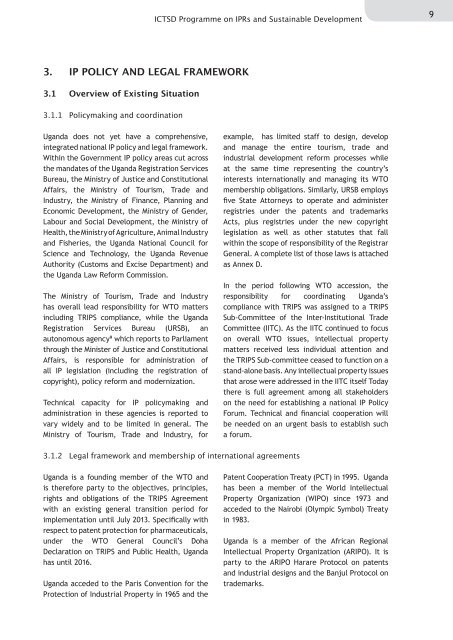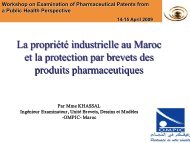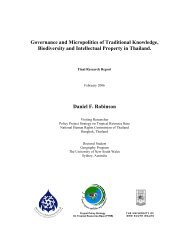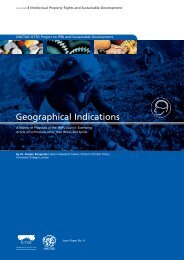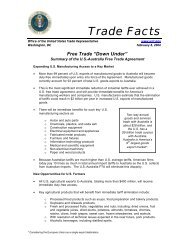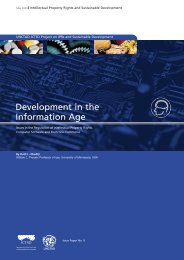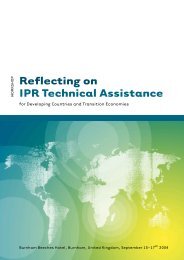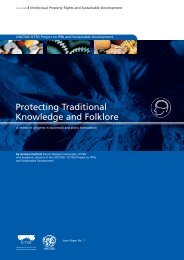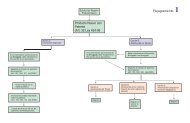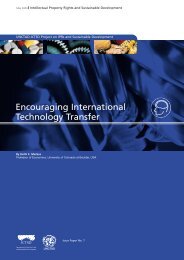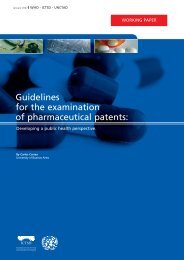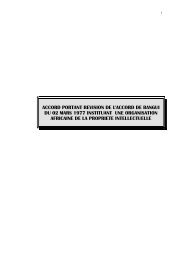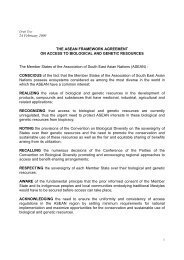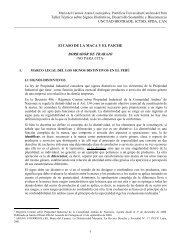Final Report of Uganda Intellectual Property ... - IPRsonline.org
Final Report of Uganda Intellectual Property ... - IPRsonline.org
Final Report of Uganda Intellectual Property ... - IPRsonline.org
Create successful ePaper yourself
Turn your PDF publications into a flip-book with our unique Google optimized e-Paper software.
ICTSD Programme on IPRs and Sustainable Development<br />
9<br />
3. IP POLICY AND LEGAL FRAMEWORK<br />
3.1 Overview <strong>of</strong> Existing Situation<br />
3.1.1 Policymaking and coordination<br />
<strong>Uganda</strong> does not yet have a comprehensive,<br />
integrated national IP policy and legal framework.<br />
Within the Government IP policy areas cut across<br />
the mandates <strong>of</strong> the <strong>Uganda</strong> Registration Services<br />
Bureau, the Ministry <strong>of</strong> Justice and Constitutional<br />
Affairs, the Ministry <strong>of</strong> Tourism, Trade and<br />
Industry, the Ministry <strong>of</strong> Finance, Planning and<br />
Economic Development, the Ministry <strong>of</strong> Gender,<br />
Labour and Social Development, the Ministry <strong>of</strong><br />
Health, the Ministry <strong>of</strong> Agriculture, Animal Industry<br />
and Fisheries, the <strong>Uganda</strong> National Council for<br />
Science and Technology, the <strong>Uganda</strong> Revenue<br />
Authority (Customs and Excise Department) and<br />
the <strong>Uganda</strong> Law Reform Commission.<br />
The Ministry <strong>of</strong> Tourism, Trade and Industry<br />
has overall lead responsibility for WTO matters<br />
including TRIPS compliance, while the <strong>Uganda</strong><br />
Registration Services Bureau (URSB), an<br />
autonomous agency 9 which reports to Parliament<br />
through the Minister <strong>of</strong> Justice and Constitutional<br />
Affairs, is responsible for administration <strong>of</strong><br />
all IP legislation (including the registration <strong>of</strong><br />
copyright), policy reform and modernization.<br />
Technical capacity for IP policymaking and<br />
administration in these agencies is reported to<br />
vary widely and to be limited in general. The<br />
Ministry <strong>of</strong> Tourism, Trade and Industry, for<br />
example, has limited staff to design, develop<br />
and manage the entire tourism, trade and<br />
industrial development reform processes while<br />
at the same time representing the country’s<br />
interests internationally and managing its WTO<br />
membership obligations. Similarly, URSB employs<br />
five State Attorneys to operate and administer<br />
registries under the patents and trademarks<br />
Acts, plus registries under the new copyright<br />
legislation as well as other statutes that fall<br />
within the scope <strong>of</strong> responsibility <strong>of</strong> the Registrar<br />
General. A complete list <strong>of</strong> those laws is attached<br />
as Annex D.<br />
In the period following WTO accession, the<br />
responsibility for coordinating <strong>Uganda</strong>’s<br />
compliance with TRIPS was assigned to a TRIPS<br />
Sub-Committee <strong>of</strong> the Inter-Institutional Trade<br />
Committee (IITC). As the IITC continued to focus<br />
on overall WTO issues, intellectual property<br />
matters received less individual attention and<br />
the TRIPS Sub-committee ceased to function on a<br />
stand-alone basis. Any intellectual property issues<br />
that arose were addressed in the IITC itself Today<br />
there is full agreement among all stakeholders<br />
on the need for establishing a national IP Policy<br />
Forum. Technical and financial cooperation will<br />
be needed on an urgent basis to establish such<br />
a forum.<br />
3.1.2 Legal framework and membership <strong>of</strong> international agreements<br />
<strong>Uganda</strong> is a founding member <strong>of</strong> the WTO and<br />
is therefore party to the objectives, principles,<br />
rights and obligations <strong>of</strong> the TRIPS Agreement<br />
with an existing general transition period for<br />
implementation until July 2013. Specifically with<br />
respect to patent protection for pharmaceuticals,<br />
under the WTO General Council’s Doha<br />
Declaration on TRIPS and Public Health, <strong>Uganda</strong><br />
has until 2016.<br />
<strong>Uganda</strong> acceded to the Paris Convention for the<br />
Protection <strong>of</strong> Industrial <strong>Property</strong> in 1965 and the<br />
Patent Cooperation Treaty (PCT) in 1995. <strong>Uganda</strong><br />
has been a member <strong>of</strong> the World <strong>Intellectual</strong><br />
<strong>Property</strong> Organization (WIPO) since 1973 and<br />
acceded to the Nairobi (Olympic Symbol) Treaty<br />
in 1983.<br />
<strong>Uganda</strong> is a member <strong>of</strong> the African Regional<br />
<strong>Intellectual</strong> <strong>Property</strong> Organization (ARIPO). It is<br />
party to the ARIPO Harare Protocol on patents<br />
and industrial designs and the Banjul Protocol on<br />
trademarks.


